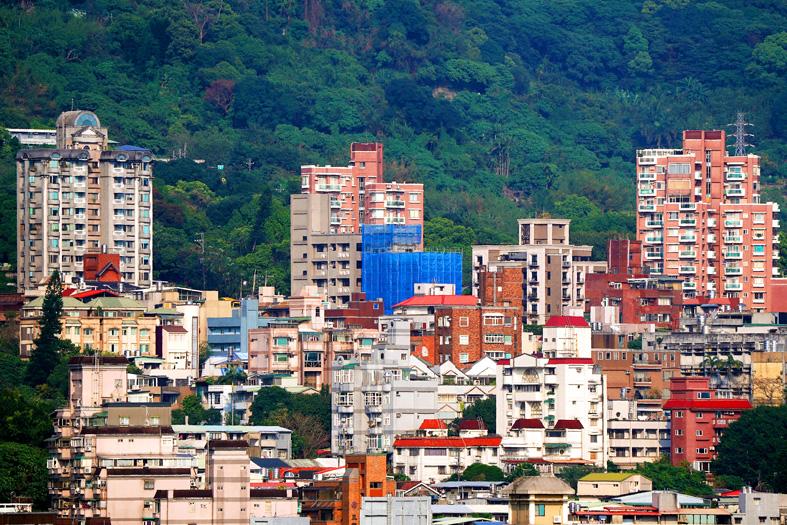The housing market last month slowed despite the start of the spring sales season, as presale projects bore the brunt of credit tightening, the Chinese-language Housing Monthly (住展雜誌) said in a report last week.
An index gauging the property market climate was 37.7 last month, rising 4 points from February to read “yellow-blue” for the 13th consecutive month, the report said, adding that the market failed to benefit from favorable seasonality.
Developers introduced record-high presale projects and newly completed houses for the sales season — from late last month through this month — to try to take advantage of buying interest fueled by excess liquidity and ultra-low interest rates, it said.

Photo: CNA
That explained why the gauge’s sub-indices on the supply of presale projects, newly completed houses and advertisements picked up, but measures on negotiation room, buying interest and sales rates declined, it added.
“Developers appear to be the biggest victim of the government’s ongoing effort to cool the property market where transactions for existing homes thrive,” Housing Monthly research manager Ho Shih-chang (何世昌) said in the report.
Buyers for presale projects have become cautious after the Ministry of Finance proposed property tax revisions that would impose tax rates of 35 to 45 percent on houses and presale projects resold within five years of purchase.
Transfers of presale projects are currently not subject to property taxes, but are treated like futures contracts since the assets would not be available for a few years.
However, presale projects have grown into a popular short-term investment tool and contribute to property price hikes, driving policymakers to introduce bills to include them as property transactions.
Visitors to presale projects and new houses averaged 40.1 per week, up slightly from 38.6 in February, which is typically lower as it is a shorter month, Ho said.
About 3.1 people or organizations entered purchase agreements each week, increasing by 0.4 from a month earlier, he said.
“The pace of improvement lagged behind expectations by a large margin,” Ho said, adding that investors seem to have fled the market, leaving people with real demand to underpin sales.
There were 4,000 advertisements last month, also lower than previous expectations, as property tax revisions and a second wave of credit controls prompted developers to avoid aggressive marketing strategies, the report said.
The reading on price concessions held resilient because developers generally refused to concede, citing rising land, labor and building material costs, Ho said, adding that the standoff would persist.

UNCERTAINTY: Innolux activated a stringent supply chain management mechanism, as it did during the COVID-19 pandemic, to ensure optimal inventory levels for customers Flat-panel display makers AUO Corp (友達) and Innolux Corp (群創) yesterday said that about 12 to 20 percent of their display business is at risk of potential US tariffs and that they would relocate production or shipment destinations to mitigate the levies’ effects. US tariffs would have a direct impact of US$200 million on AUO’s revenue, company chairman Paul Peng (彭雙浪) told reporters on the sidelines of the Touch Taiwan trade show in Taipei yesterday. That would make up about 12 percent of the company’s overall revenue. To cope with the tariff uncertainty, AUO plans to allocate its production to manufacturing facilities in

Taiwan will prioritize the development of silicon photonics by taking advantage of its strength in the semiconductor industry to build another shield to protect the local economy, National Development Council (NDC) Minister Paul Liu (劉鏡清) said yesterday. Speaking at a meeting of the legislature’s Economics Committee, Liu said Taiwan already has the artificial intelligence (AI) industry as a shield, after the semiconductor industry, to safeguard the country, and is looking at new unique fields to build more economic shields. While Taiwan will further strengthen its existing shields, over the longer term, the country is determined to focus on such potential segments as

TAKING STOCK: A Taiwanese cookware firm in Vietnam urged customers to assess inventory or place orders early so shipments can reach the US while tariffs are paused Taiwanese businesses in Vietnam are exploring alternatives after the White House imposed a 46 percent import duty on Vietnamese goods, following US President Donald Trump’s announcement of “reciprocal” tariffs on the US’ trading partners. Lo Shih-liang (羅世良), chairman of Brico Industry Co (裕茂工業), a Taiwanese company that manufactures cast iron cookware and stove components in Vietnam, said that more than 40 percent of his business was tied to the US market, describing the constant US policy shifts as an emotional roller coaster. “I work during the day and stay up all night watching the news. I’ve been following US news until 3am

COLLABORATION: Given Taiwan’s key position in global supply chains, the US firm is discussing strategies with local partners and clients to deal with global uncertainties Advanced Micro Devices Inc (AMD) yesterday said it is meeting with local ecosystem partners, including Taiwan Semiconductor Manufacturing Co (TSMC, 台積電), to discuss strategies, including long-term manufacturing, to navigate uncertainties such as US tariffs, as Taiwan occupies an important position in global supply chains. AMD chief executive officer Lisa Su (蘇姿丰) told reporters that Taiwan is an important part of the chip designer’s ecosystem and she is discussing with partners and customers in Taiwan to forge strong collaborations on different areas during this critical period. AMD has just become the first artificial-intelligence (AI) server chip customer of TSMC to utilize its advanced